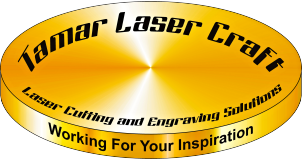Updated:
18 January 2015
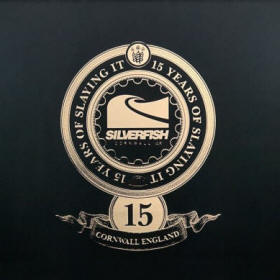
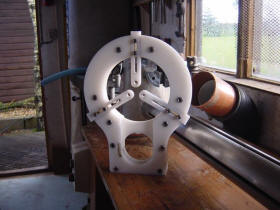 Acetal is an excellent material from which to
manufacture some tooling and jigs.
There are certainly other plastics around that may
be successfully engraved, but experimentation on a
sample is often required.
Pretty well the only plastic material that we
don’t cut or engrave is PVC, as the fumes are not
friendly to people, animals, laser machines or the world
in general.
Acetal is an excellent material from which to
manufacture some tooling and jigs.
There are certainly other plastics around that may
be successfully engraved, but experimentation on a
sample is often required.
Pretty well the only plastic material that we
don’t cut or engrave is PVC, as the fumes are not
friendly to people, animals, laser machines or the world
in general.
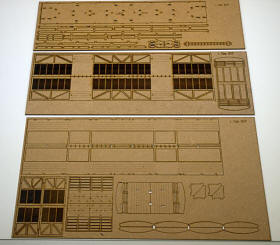 MDF is also a very suited material for laser work,
producing interesting engraved results and having good
properties for use where accurate and intricate cutting
is required.
Given a suitable graphic, 3D laser carving
can produce superb results on maple, cherry, birch,
butternut, alder and MDF. The process works by burning
away material at different intensities over 256 shades
of grey to produce a carved, three dimensional
image.
Some papers, along with card and fibreboard, are well
suited to laser cutting which can create intricate and
delicate patterns.
MDF is also a very suited material for laser work,
producing interesting engraved results and having good
properties for use where accurate and intricate cutting
is required.
Given a suitable graphic, 3D laser carving
can produce superb results on maple, cherry, birch,
butternut, alder and MDF. The process works by burning
away material at different intensities over 256 shades
of grey to produce a carved, three dimensional
image.
Some papers, along with card and fibreboard, are well
suited to laser cutting which can create intricate and
delicate patterns.
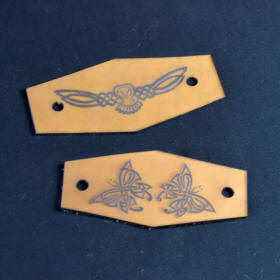 Leather can be cut and is very well suited to laser
engraving, producing a result which is akin to branding.
Certain latex rubber compounds can be laser engraved to
produce rubber hand stamps.
Leather can be cut and is very well suited to laser
engraving, producing a result which is akin to branding.
Certain latex rubber compounds can be laser engraved to
produce rubber hand stamps.
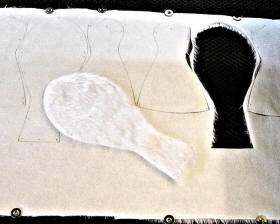 Quite a diverse range of textiles and fabrics are
candidates for the laser, with materials including Silk,
Cotton, Linen, Aramid, Fleece, Lace, Polyester and felt
being suitable for cutting, along with technical fabrics
such as Kevlar.
Decorative designs and logos can be engraved onto Fleece
garments and felt cloth and produces a fine tactile
effect.
Being a tool-free process, with no direct contact with the
material, there is no distortion, with synthetic
material having perfectly sealed edges and no fraying.
When working with natural fibres, such as cotton or
linen, the cutting edge can show some brown
discolouration which can be corrected to a greater
degree by adjusting the speed and power of the laser.
Sometimes, as with other materials, this scorching
effect can be used to effect as part of the design.
Whether engraving fleece jacket, producing artistic
fashion forms or an artwork, laser cutting offers incredible design
options, and virtually any design can be realised by
utilising the laser process from fashion wear to
lampshades.
~~~ It is All Down to the Scope of Your
Imagination ~~~
To see how we can
help you to realise your ideas, please
contact us here.
Quite a diverse range of textiles and fabrics are
candidates for the laser, with materials including Silk,
Cotton, Linen, Aramid, Fleece, Lace, Polyester and felt
being suitable for cutting, along with technical fabrics
such as Kevlar.
Decorative designs and logos can be engraved onto Fleece
garments and felt cloth and produces a fine tactile
effect.
Being a tool-free process, with no direct contact with the
material, there is no distortion, with synthetic
material having perfectly sealed edges and no fraying.
When working with natural fibres, such as cotton or
linen, the cutting edge can show some brown
discolouration which can be corrected to a greater
degree by adjusting the speed and power of the laser.
Sometimes, as with other materials, this scorching
effect can be used to effect as part of the design.
Whether engraving fleece jacket, producing artistic
fashion forms or an artwork, laser cutting offers incredible design
options, and virtually any design can be realised by
utilising the laser process from fashion wear to
lampshades.
~~~ It is All Down to the Scope of Your
Imagination ~~~
To see how we can
help you to realise your ideas, please
contact us here.
Materials for Laser Cutting and/or Engraving
There are a wide variety of materials which can be cut, engraved, etched or marked by a laser. Most will come under the generic headings of Wood, Leather, Paper and Card, Plastics, Textiles, Metals, Ceramics, Stone, Glass.
Plastics
The most commonly used plastics used for laser cutting and engraving are cast acrylic and extruded acrylic sheet, along with other cast resins which produce good results with a flame polished finish to the cut edges. Out of cast and extruded acrylic sheets, cast acrylic produces the best engraved results. A commonly engraved material for awards is a cast acrylic shape which is generally laser engraved from the rear side. For signage, trophy plates, makers plates or electrical switch panels and the like, particular plastic laminates have been developed for laser engraving which are designed to conduct excess heat away from the material, effectively reducing deformation. The thin outer laminates of this material vaporises easily to expose the different coloured material of the underlying substrate. There are probably more plastics available to the laser process than are not. The main plastic materials that can be laser processed include ABS, PA, PI, PP, PES ABS, Petg, Delrin(Acetal), UHMW, Hips and PC. While all of these cut with by laser, not all of them can be engraved. For example, styrene, used for compact disc cases, and many of the thermoforming plastics can be laser cut but are not successful when it comes to engraving. They tend to melt around the laser spot, producing a soft rather than a sharp image and the material may deform. Acetal is an excellent material from which to
manufacture some tooling and jigs.
There are certainly other plastics around that may
be successfully engraved, but experimentation on a
sample is often required.
Pretty well the only plastic material that we
don’t cut or engrave is PVC, as the fumes are not
friendly to people, animals, laser machines or the world
in general.
Acetal is an excellent material from which to
manufacture some tooling and jigs.
There are certainly other plastics around that may
be successfully engraved, but experimentation on a
sample is often required.
Pretty well the only plastic material that we
don’t cut or engrave is PVC, as the fumes are not
friendly to people, animals, laser machines or the world
in general.
Wood, Wood Derivatives and Natural Materials
Laser Engraving hardwoods like boxwood, beech, basswood (lindenwood or lime), walnut, mahogany, alder and maple can produce successful pyrography effects. Softwoods such as pine can be engraved but, due to the hard and soft bands of the grain structure, they tend to vaporize at less-consistent depths. Birch plywood engraves and cuts very well and other plywoods can be used for jigs, tooling and even clock gears. MDF is also a very suited material for laser work,
producing interesting engraved results and having good
properties for use where accurate and intricate cutting
is required.
Given a suitable graphic, 3D laser carving
can produce superb results on maple, cherry, birch,
butternut, alder and MDF. The process works by burning
away material at different intensities over 256 shades
of grey to produce a carved, three dimensional
image.
Some papers, along with card and fibreboard, are well
suited to laser cutting which can create intricate and
delicate patterns.
MDF is also a very suited material for laser work,
producing interesting engraved results and having good
properties for use where accurate and intricate cutting
is required.
Given a suitable graphic, 3D laser carving
can produce superb results on maple, cherry, birch,
butternut, alder and MDF. The process works by burning
away material at different intensities over 256 shades
of grey to produce a carved, three dimensional
image.
Some papers, along with card and fibreboard, are well
suited to laser cutting which can create intricate and
delicate patterns.
 Leather can be cut and is very well suited to laser
engraving, producing a result which is akin to branding.
Certain latex rubber compounds can be laser engraved to
produce rubber hand stamps.
Leather can be cut and is very well suited to laser
engraving, producing a result which is akin to branding.
Certain latex rubber compounds can be laser engraved to
produce rubber hand stamps.
Metals
It is not possible to cut or etch metals using a CO2 laser, such as the machine that we use. However, metals can be permanently marked by our laser machine. You can find out more about the laser marking process here. Coated Metals Metal plates are manufactured specifically for ablation by laser engraving. A polished metal is coated with thin paint layer which is formulated to be ablated cleanly. Impressive results can be achieved by exposing brass, stainless steel or silver-coated steel lettering on a black or dark background. A wide variety of substrate are available, including polished, satin and brushed finishes along with different coloured coatings. For artists it can create an effect akin to scraper board work.Stone and Glass
Stone or glass does not vapourise very easily and is traditionally engraved using mechanical methods, usually by sandblasting or diamond cutting. However, when a laser beam hits glass or stone the surface is heated very quickly, producing microscopic sized chips that are ejected from the surface to produce some excellent results.Ceramics
Like metal marking, ceramics are laser marked by first applying a heat reactive compound to the surface. The laser beam then fuses the marking compound with the metal, leaving behind a dark mark that does not rub off and is resistant to chemicals such as cleaners, acids and solvents. Currently available colours for laser marking ceramics are black, bronze, blue and green.Textiles
 Quite a diverse range of textiles and fabrics are
candidates for the laser, with materials including Silk,
Cotton, Linen, Aramid, Fleece, Lace, Polyester and felt
being suitable for cutting, along with technical fabrics
such as Kevlar.
Decorative designs and logos can be engraved onto Fleece
garments and felt cloth and produces a fine tactile
effect.
Being a tool-free process, with no direct contact with the
material, there is no distortion, with synthetic
material having perfectly sealed edges and no fraying.
When working with natural fibres, such as cotton or
linen, the cutting edge can show some brown
discolouration which can be corrected to a greater
degree by adjusting the speed and power of the laser.
Sometimes, as with other materials, this scorching
effect can be used to effect as part of the design.
Whether engraving fleece jacket, producing artistic
fashion forms or an artwork, laser cutting offers incredible design
options, and virtually any design can be realised by
utilising the laser process from fashion wear to
lampshades.
~~~ It is All Down to the Scope of Your
Imagination ~~~
To see how we can
help you to realise your ideas, please
contact us here.
Quite a diverse range of textiles and fabrics are
candidates for the laser, with materials including Silk,
Cotton, Linen, Aramid, Fleece, Lace, Polyester and felt
being suitable for cutting, along with technical fabrics
such as Kevlar.
Decorative designs and logos can be engraved onto Fleece
garments and felt cloth and produces a fine tactile
effect.
Being a tool-free process, with no direct contact with the
material, there is no distortion, with synthetic
material having perfectly sealed edges and no fraying.
When working with natural fibres, such as cotton or
linen, the cutting edge can show some brown
discolouration which can be corrected to a greater
degree by adjusting the speed and power of the laser.
Sometimes, as with other materials, this scorching
effect can be used to effect as part of the design.
Whether engraving fleece jacket, producing artistic
fashion forms or an artwork, laser cutting offers incredible design
options, and virtually any design can be realised by
utilising the laser process from fashion wear to
lampshades.
~~~ It is All Down to the Scope of Your
Imagination ~~~
To see how we can
help you to realise your ideas, please
contact us here.
